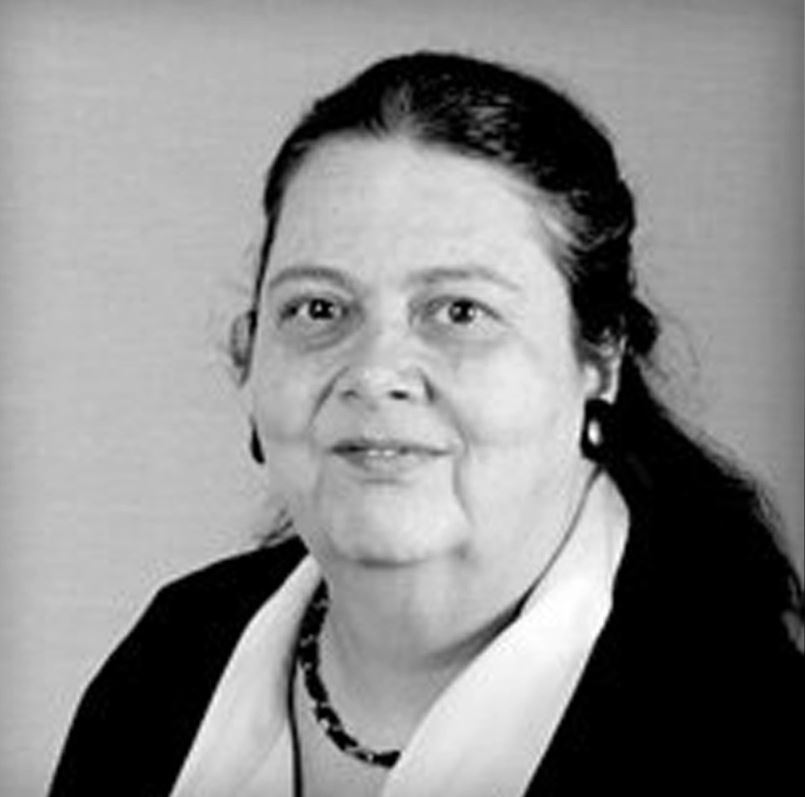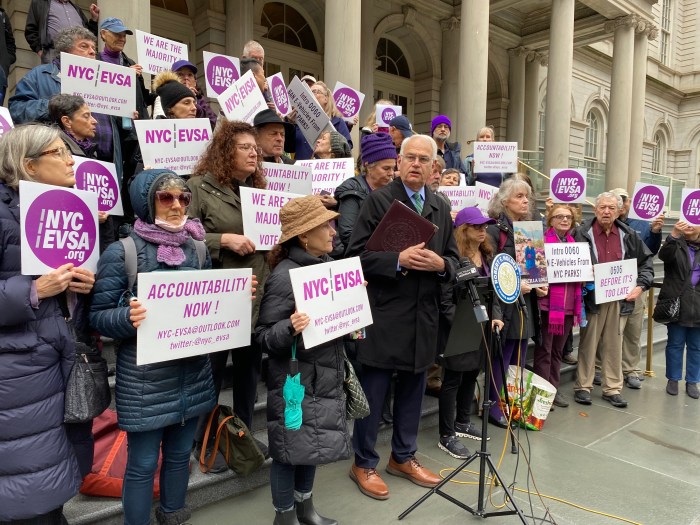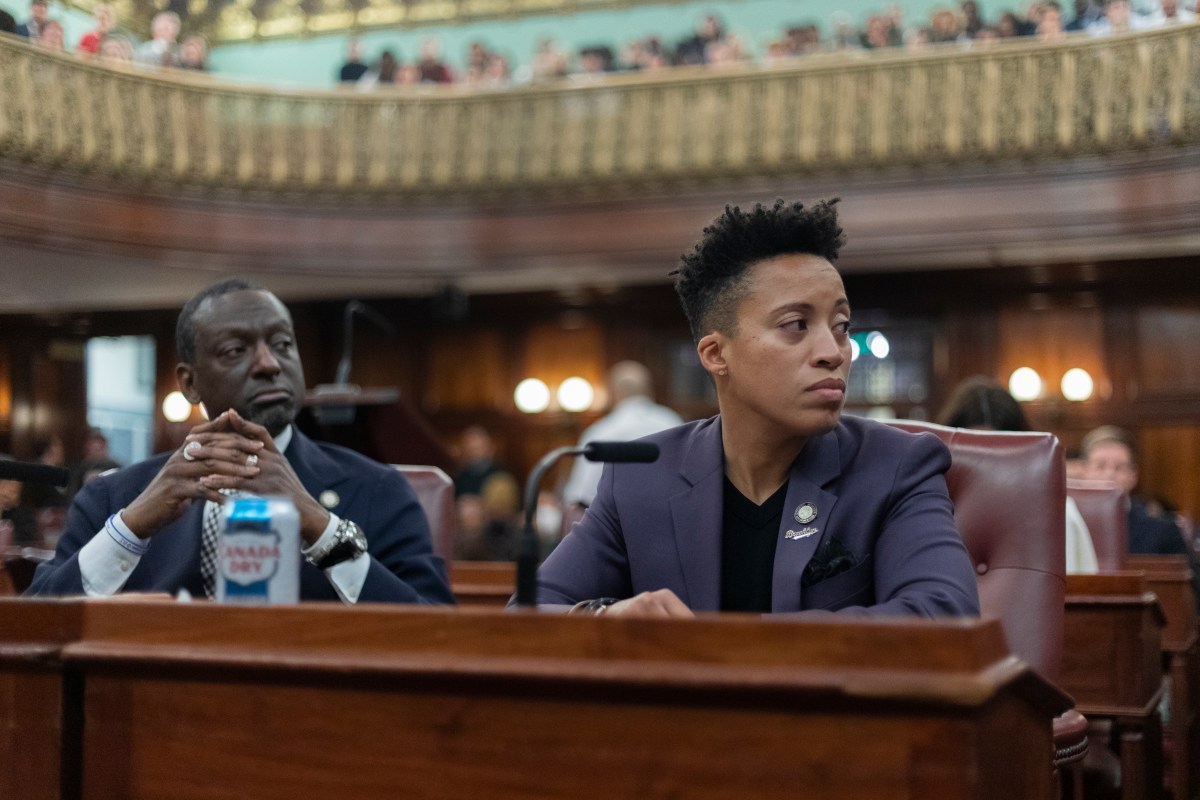
Liz Shollenberger, who served as Greenwich Village’s female Democratic district leader from 1986 to 1995, was a member of Community Board 2 from 1986 to 1996, and went on to become a City Court judge in White Plains, in Westchester County, died on Sept. 5. She was 63.
Shollenberger died in the hospital from an infection. She had been battling a respiratory illness, and had suffered from various illnesses for more than 15 years.
After graduating from high school in Circleville, Ohio, as co-valedictorian of her class, Shollenberger went on to graduate from Princeton University in 1978 and from Yale Law School in 1981. In early 1982, she landed an apartment on E. Ninth St., between Broadway and University Place. Even before that, she had become active in Village politics.
Following law school, Shollenberger worked for three private law firms in New York City and taught for two years at New York University School of Law (where one of her students was John Kennedy, Jr.) before finding her major career niche as a Legal Services attorney, representing indigent clients in the Bronx and Queens for more than 20 years.
Shollenberger spent the bulk of her legal career as a Legal Services attorney, representing indigent clients, first in the Bronx, where she became the head of the Housing Unit for the South Bronx, and later, of the program providing legal services to the elderly, and then in Queens, where she headed the public-benefits unit. In Housing Court, Shollenberger reveled in being an equalizer, altering the radical imbalance of power that normally exists there between low-income tenants (usually unrepresented) and the attorneys for landlords. Armed with her “Housing Court Spanish” (as she called it), a quickly acquired expertise in the substantive and procedural aspects of housing law, and a cheerful but steely willingness to go to trial in any case where she felt the landlord was not being reasonable, Shollenberger became a force in Bronx Housing Court.
In 2005, she won a landmark housing case in New York’s high court, the Court of Appeals, which established that a married woman could maintain a primary residence different from that of her husband. In 2007, she was honored with the Legal Services Award for service to indigent clients.
In 1983, at age 27, Shollenberger became the first president of the Village Reform Democratic Club. In 1986, she was elected in a primary as female Democratic district leader for Greenwich Village, representing a district that encompassed about three-quarters of the 66th Assembly District. Her election ended the Village Independent Democrats’ 25-year exclusive hold on the Village district leader posts.
A more politically moderate “pro-Koch” faction, V.R.D.C. members broke away from V.I.D. to form their own club after the latter’s endorsing of Mario Cuomo over Koch for governor and disagreements over other issues.
She held that position for nine years, winning two more primary contests and then winning two more terms without opposition. She lost a primary in 1995, ending her tenure as district leader.
Elected at a time of quickly rising crime and what was perceived as a declining “quality of life” in the Village, Shollenberger combined traditional liberal Democratic values on many issues with an emphasis on reclaiming parks and other public spaces from crime and other activities that decreased the ability of many to enjoy those public spaces.
Beginning in 1983 and continuing for more than 20 years after that, Shollenberger operated a free tenant clinic, holding office hours in the rectory at Our Lady of Pompeii Church, on Carmine St., every other Saturday morning for Village tenants in need of legal advice and assistance. She continued to operate the clinic for several years after her 1999 move from the Village to White Plains. Her volunteer activities also included service as a volunteer attorney for Gay Men’s Health Crisis, helping to write wills for people with AIDS who were facing death and not financially able to hire an attorney to do that for them.
One of the accomplishments during her tenure as district leader of which she was most proud was the role she played in the initial election to Congress of Representative Jerry Nadler in 1992. She mobilized support for Nadler among members of the Democratic County Committee from the Village at the party meeting that nominated Nadler to replace former Representative Ted Weiss, who had died the day before the 1992 primary.
Shollenberger ran for Civil Court judge in Lower Manhattan’s First District in 1996, losing to Paul Feinman by just 24 votes out of 7,300 cast. (Simon is now one of the seven members of the state’s highest court, the Court of Appeals.)
After moving to White Plains, in 1999, with her husband, Tim James (whom she met at Princeton), Shollenberger immediately got involved with the White Plains Democratic Party. Less than four years later, in 2003, she was elected chairperson of the White Plains Democratic City Committee — a position in which she served for more than 13 years, until her appointment by the White Plains Common Council at the end of 2016 to be a City Court judge. She also served as a member of New York’s Democratic State Committee from 2014 until her appointment to the bench.
James, who works as an attorney in New York City, succeeded his wife as chairperson of the White Plains Democratic City Committee.
In addition to her husband, Shollenberger is survived by her mother, Nancy Shollenberger, of Circleville, and her half-sister, Diane Kuipers, of Lebanon, Tennessee.
There will not be a funeral or memorial service for Shollenberger right away. A memorial service for her will be held in White Plains at a time and place to be determined.




































